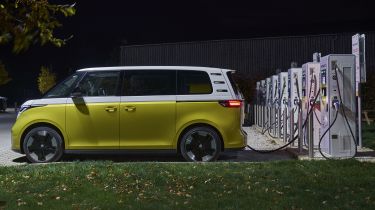Volkswagen ID. Buzz: range, battery & charging
A solid range of over 280 miles for all ID. Buzz models is paired with 200kW rapid charging
| Model | Battery size | Range | Wallbox charge time | Rapid charge time |
| ID. Buzz | 79kWh | 291 miles | 10hrs 45mins (7.4kW) | 30mins (10-80%, 200kW) |
| ID. Buzz LWB | 86kWh | 283 miles | 12hrs (7.4kW | 30mins (10-80%, 200kW) |
The Volkswagen ID. Buzz shares its batteries with several other members of VW’s fully-electric line-up, including the ID.3, ID.4 and ID.5 SUVs. Due to its larger size, the ID. Buzz can’t quite manage the same sort of distances as these models, but every variant still offers more than enough miles for most everyday needs, and long-distance journeys won’t be a problem.
In order to boost sustainability, Volkswagen will take back the battery packs at the end of their working life and then repurpose or recycle them.
Volkswagen ID. Buzz range
Volkswagen upgraded the short wheelbase ID. Buzz’s battery as part of a refresh in mid-2024, and the older 77kWh pack has now been replaced with a slightly bigger 79kWh unit.
The result is an increased claimed battery range from 257 to 291 miles for the standard-size model in Life trim, dropping slightly to 286 miles on the higher-spec Style. The seven-seater ID. Buzz LWB, meanwhile, is powered by a larger 88kWh unit which returns a similarly substantial range of 283 miles on the WLTP combined cycle in base spec, or 277 miles in Style trim.
When it arrives, the more powerful Volkswagen ID. Buzz GTX will be powered by the same battery packs, but we’d expect these range figures to decline due to its additional motor and increased power output.
In comparison, some other fully-electric seven-seaters such as the Vauxhall Combo Life Electric and Peugeot E-Rifter fail to top the 200-mile mark. While nine-seaters like the Ford E-Tourneo Custom and Peugeot E-Traveller offer 209 and 217 miles respectively.
Charge time
The arrival of the new 79kWh battery on the Volkswagen ID. Buzz SWB also brought along an increased rapid DC charging speed. The peak rate now stands at 200kW (up from 170kW) and this means a 10-80% top-up takes around half an hour, and this time also applies to the LWB’s 88kWh pack.
If you want to fully replenish the ID. Buzz’s driving range via a 7.4kW home wallbox or on-street charging point, the SWB will need to be plugged in for just shy of 11 hours, while the LWB will need around 12 hours.

